Solo Practice Attorney Resume Examples

Jul 18, 2024
|
12 min read
How to write a solo practice attorney resume: make your case clearly and concisely. Learn to highlight your skills, experience, and strengths to stand out from the competition and win your dream clients.
Rated by 348 people
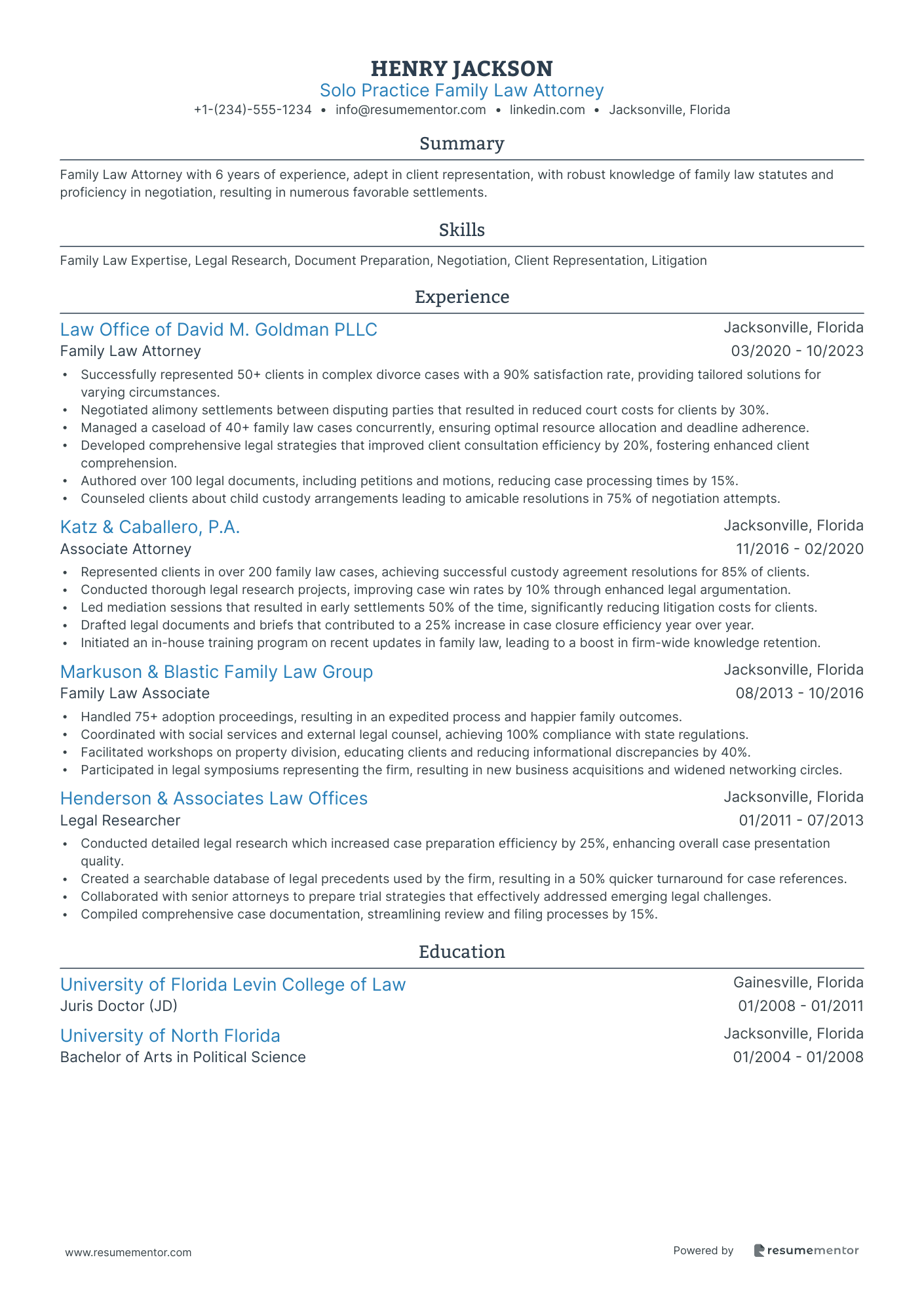
Solo Practice Family Law Attorney
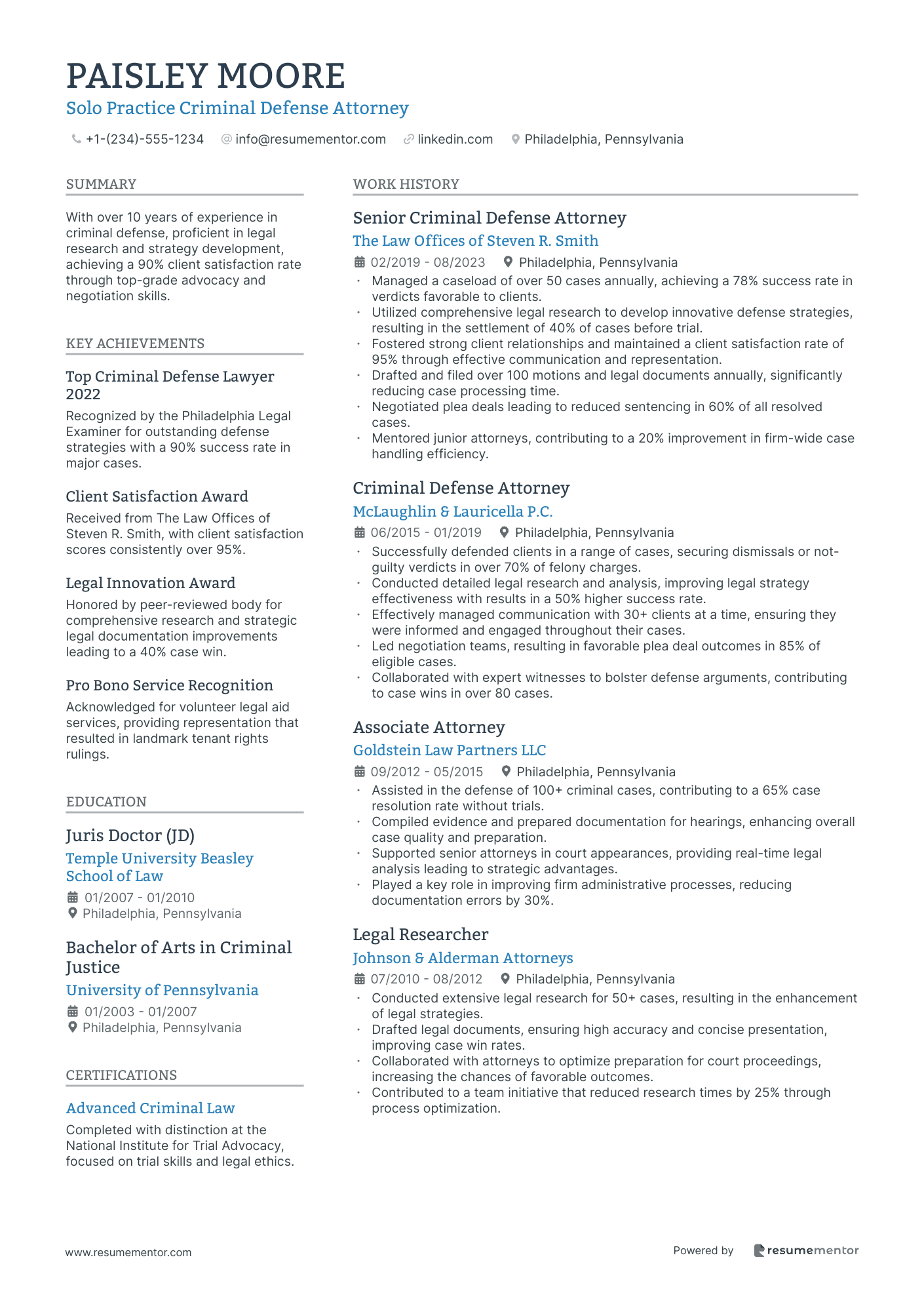
Solo Practice Criminal Defense Attorney
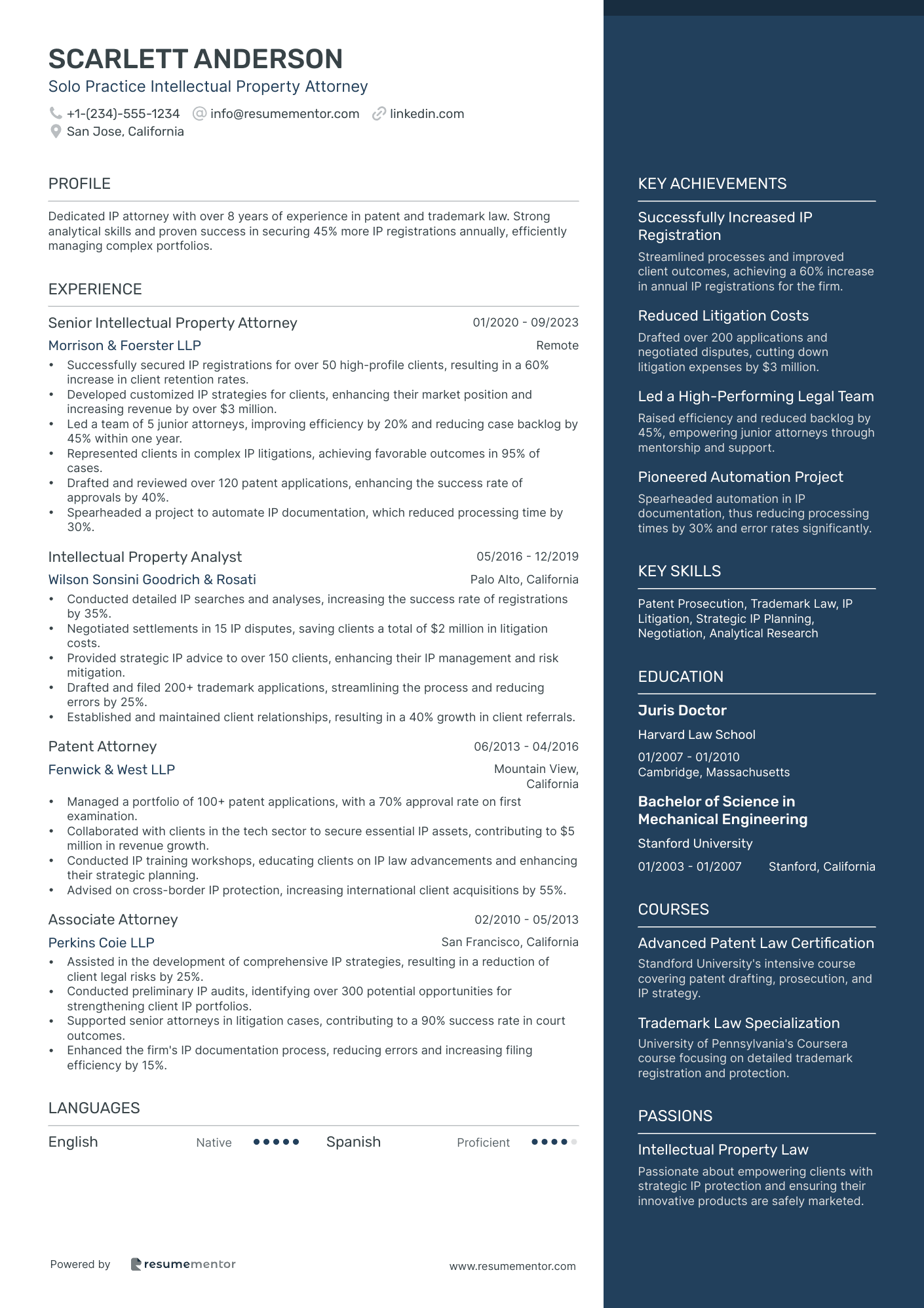
Solo Practice Intellectual Property Attorney
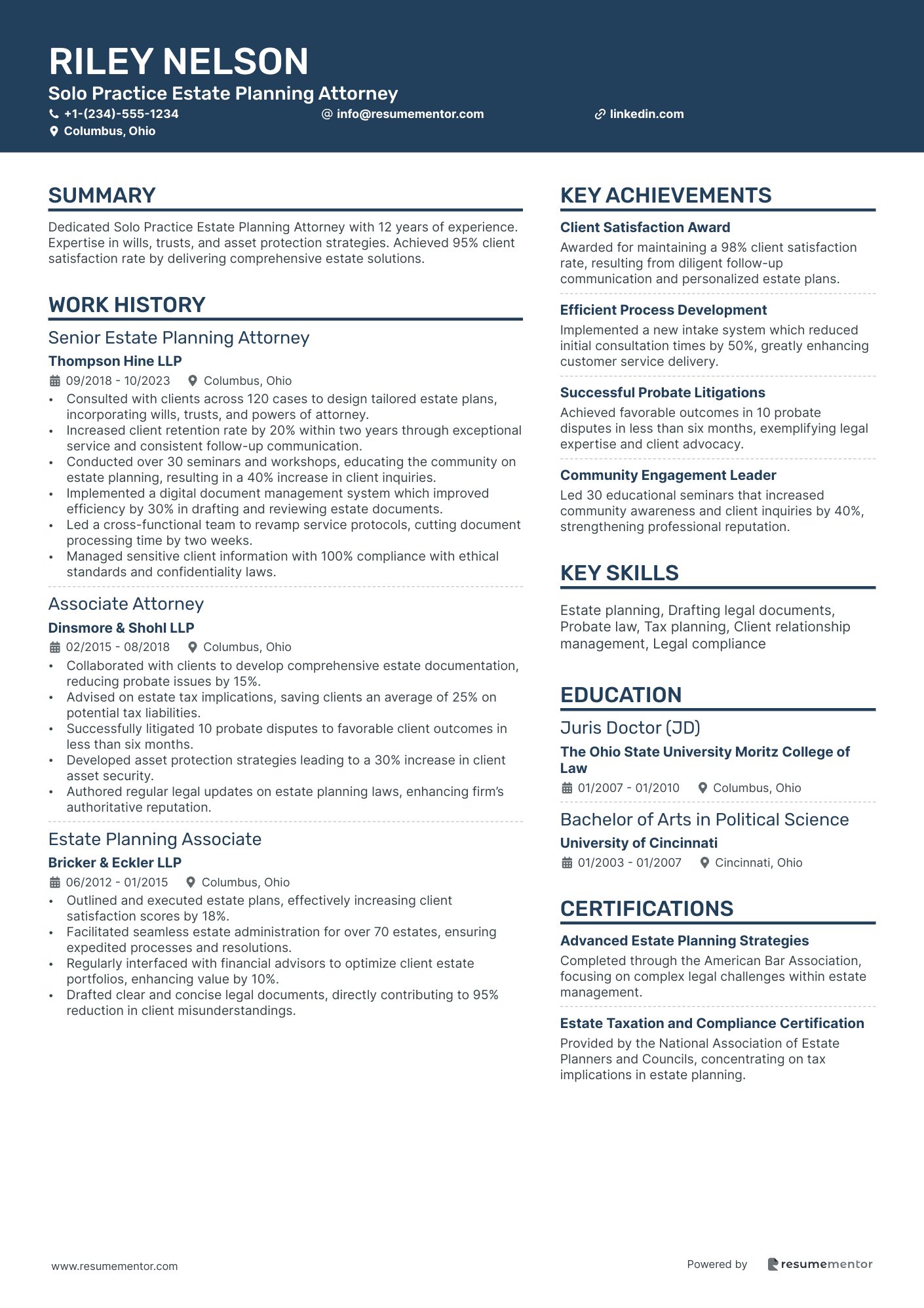
Solo Practice Estate Planning Attorney
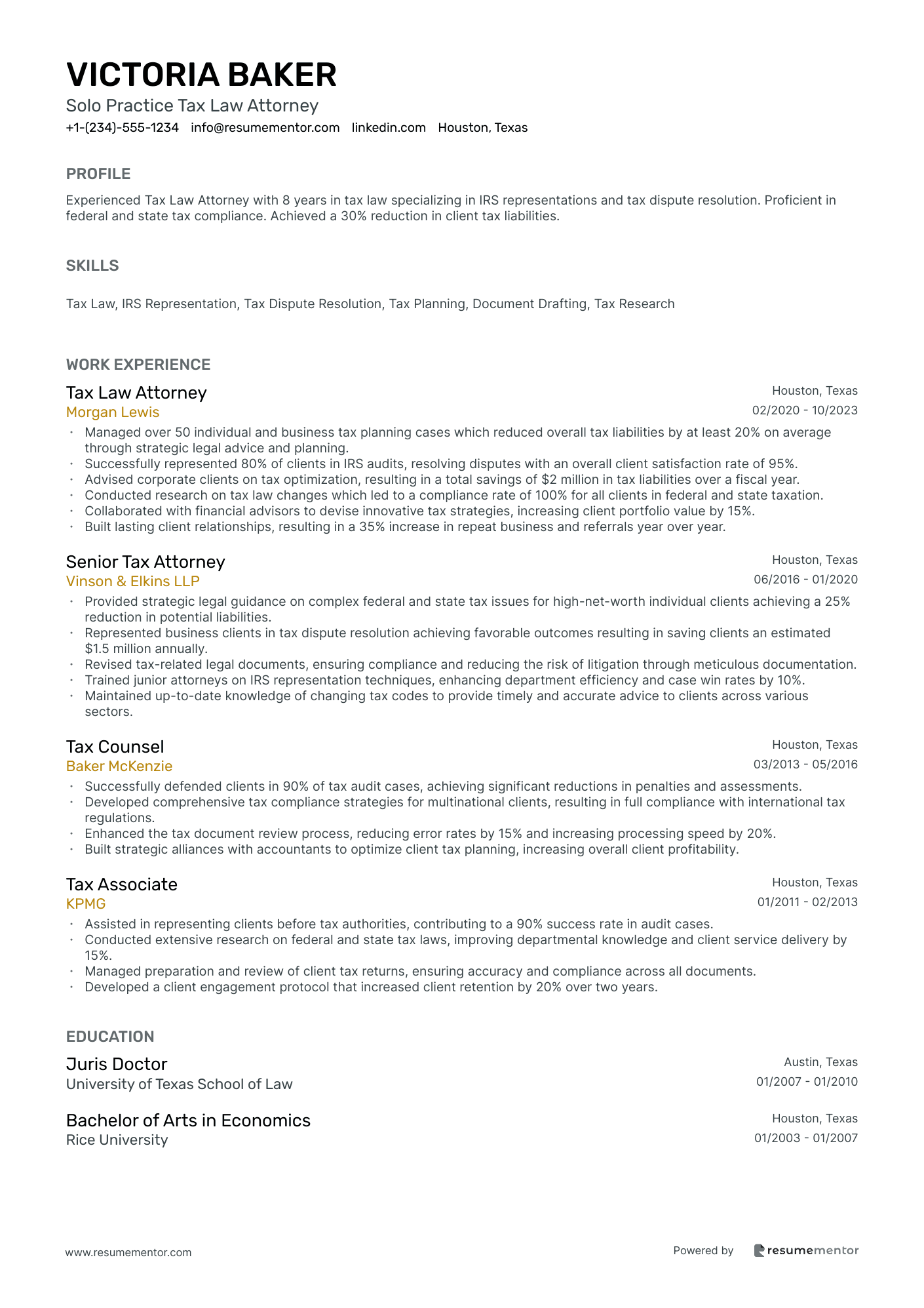
Solo Practice Tax Law Attorney
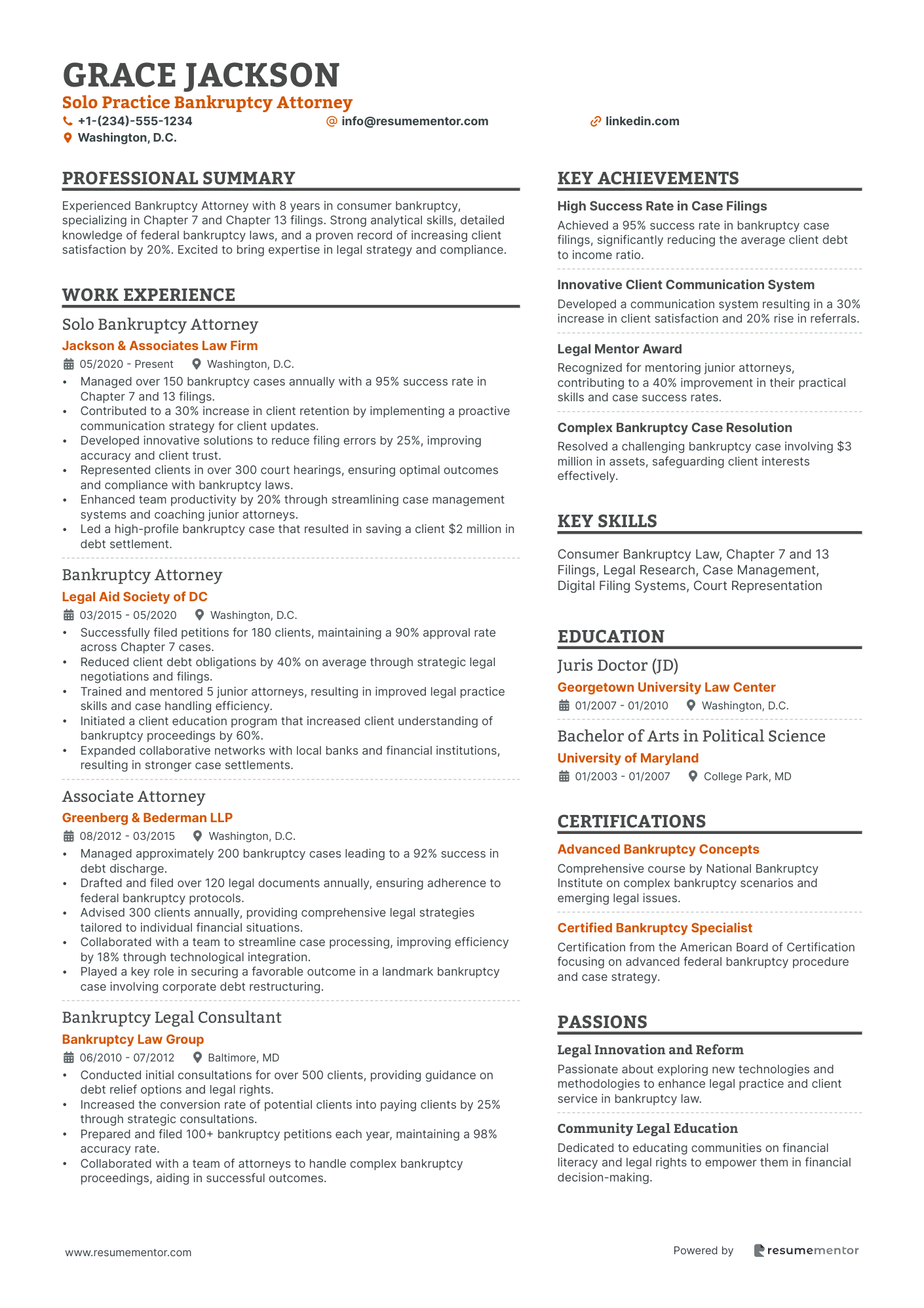
Solo Practice Bankruptcy Attorney
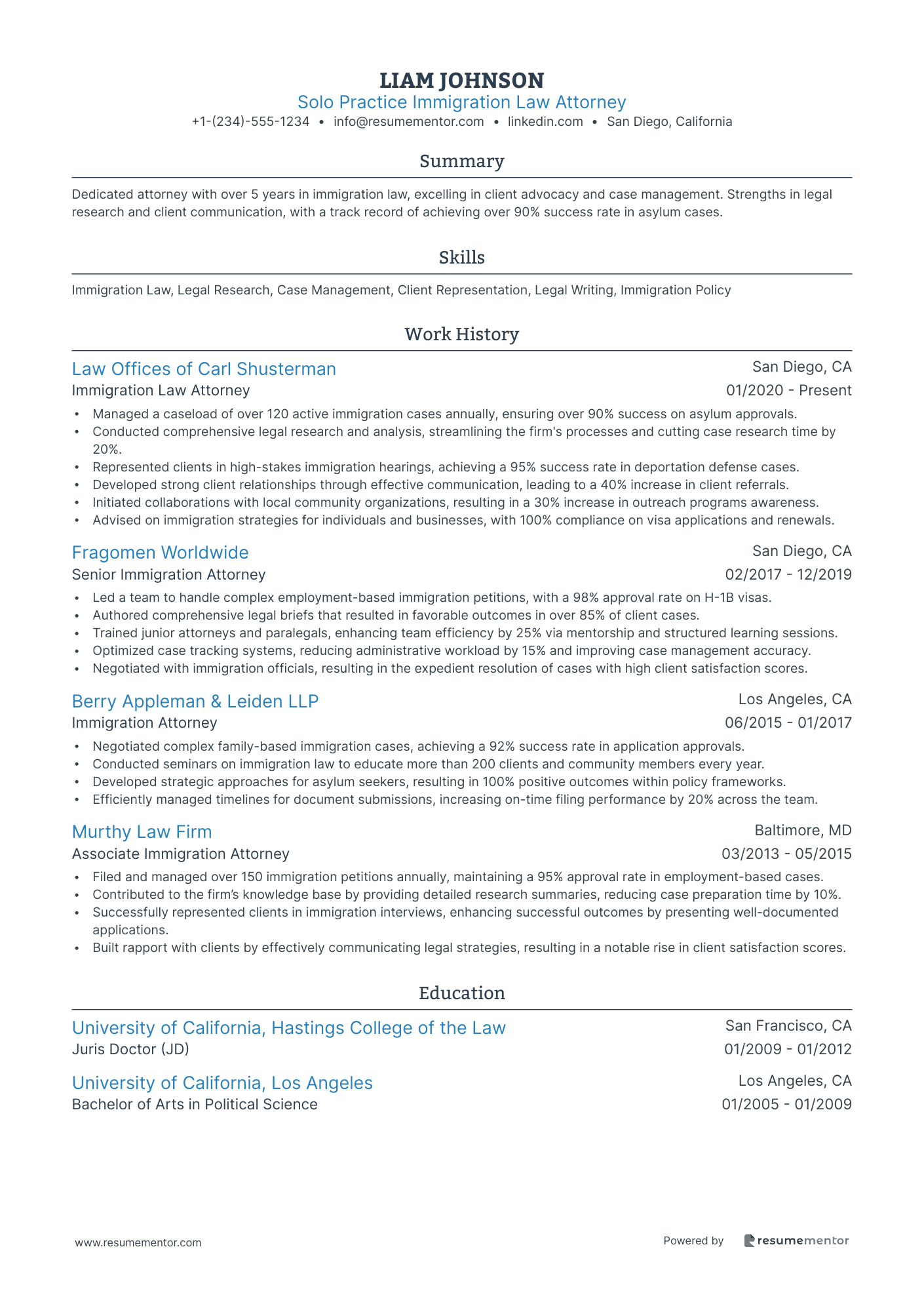
Solo Practice Immigration Law Attorney
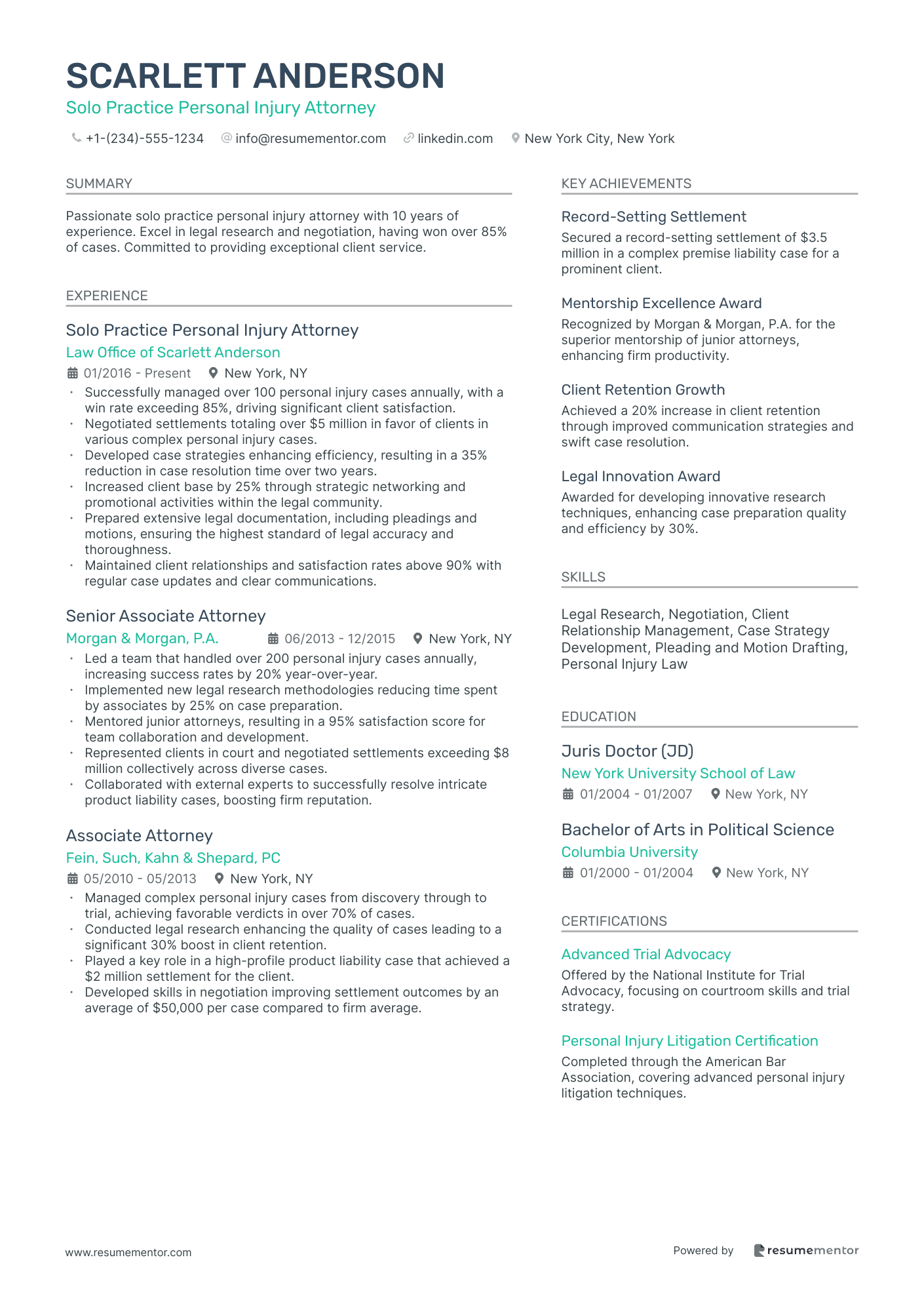
Solo Practice Personal Injury Attorney
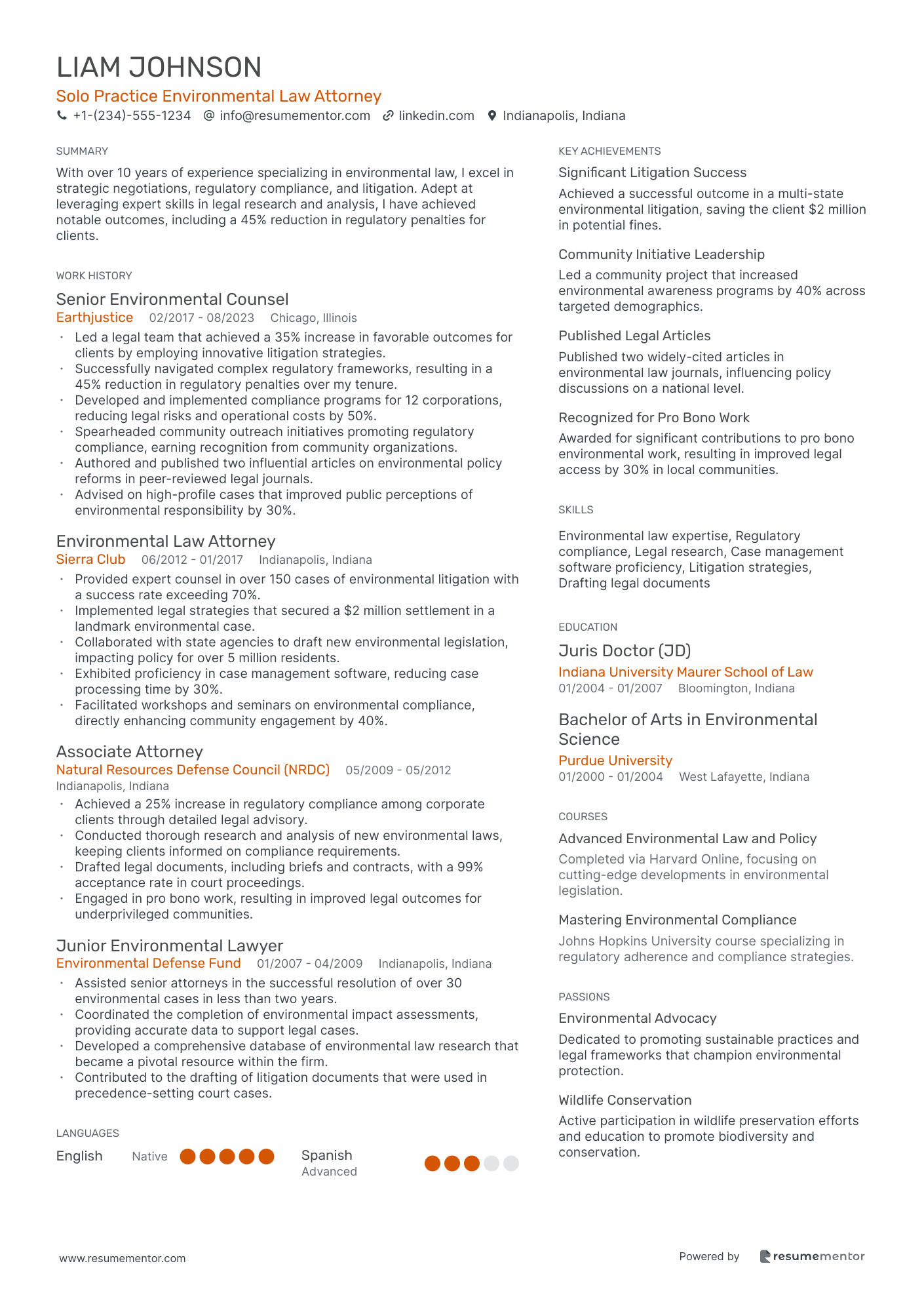
Solo Practice Environmental Law Attorney
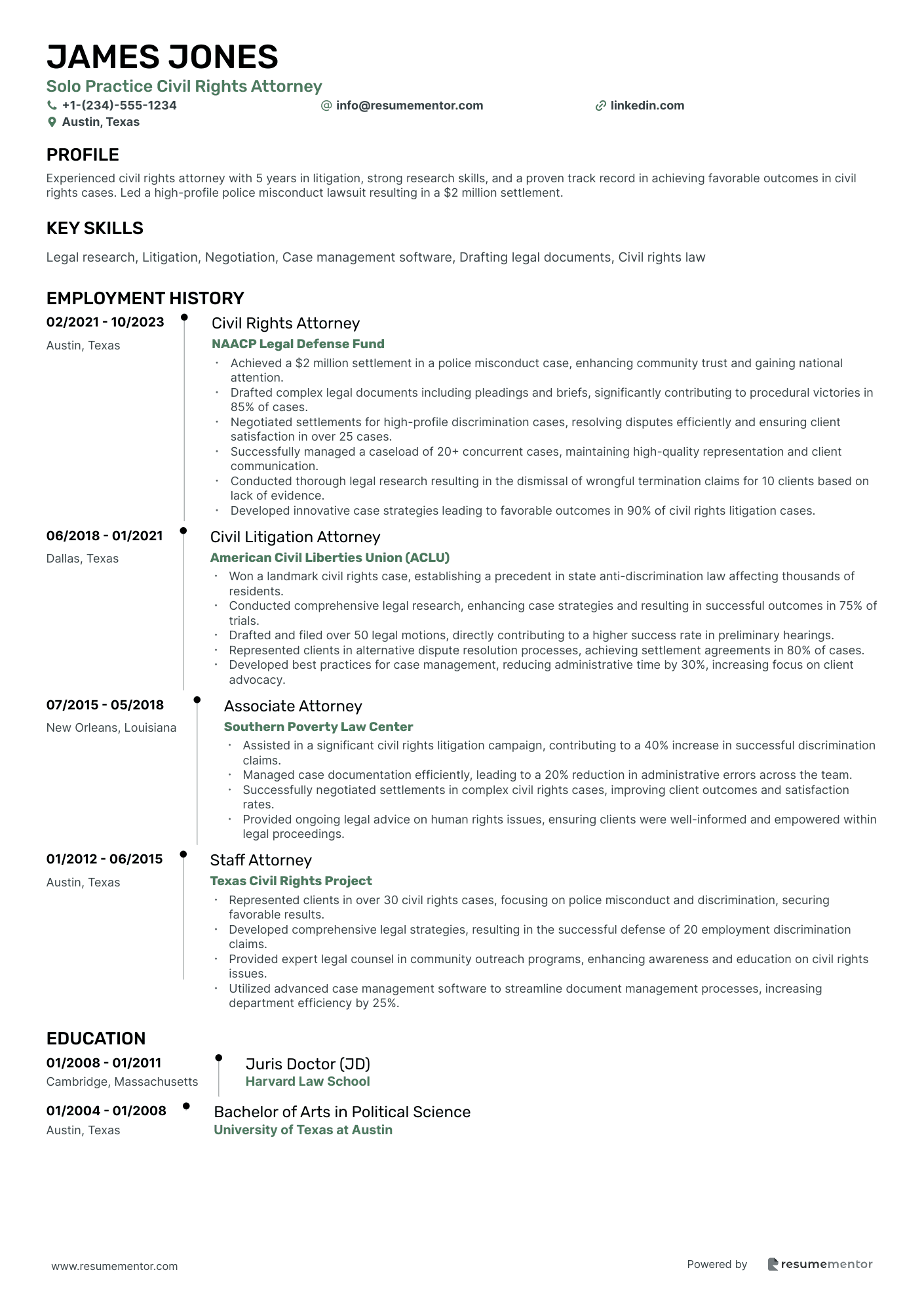
Solo Practice Civil Rights Attorney

Solo Practice Family Law Attorney resume sample
- •Successfully represented 50+ clients in complex divorce cases with a 90% satisfaction rate, providing tailored solutions for varying circumstances.
- •Negotiated alimony settlements between disputing parties that resulted in reduced court costs for clients by 30%.
- •Managed a caseload of 40+ family law cases concurrently, ensuring optimal resource allocation and deadline adherence.
- •Developed comprehensive legal strategies that improved client consultation efficiency by 20%, fostering enhanced client comprehension.
- •Authored over 100 legal documents, including petitions and motions, reducing case processing times by 15%.
- •Counseled clients about child custody arrangements leading to amicable resolutions in 75% of negotiation attempts.
- •Represented clients in over 200 family law cases, achieving successful custody agreement resolutions for 85% of clients.
- •Conducted thorough legal research projects, improving case win rates by 10% through enhanced legal argumentation.
- •Led mediation sessions that resulted in early settlements 50% of the time, significantly reducing litigation costs for clients.
- •Drafted legal documents and briefs that contributed to a 25% increase in case closure efficiency year over year.
- •Initiated an in-house training program on recent updates in family law, leading to a boost in firm-wide knowledge retention.
- •Handled 75+ adoption proceedings, resulting in an expedited process and happier family outcomes.
- •Coordinated with social services and external legal counsel, achieving 100% compliance with state regulations.
- •Facilitated workshops on property division, educating clients and reducing informational discrepancies by 40%.
- •Participated in legal symposiums representing the firm, resulting in new business acquisitions and widened networking circles.
- •Conducted detailed legal research which increased case preparation efficiency by 25%, enhancing overall case presentation quality.
- •Created a searchable database of legal precedents used by the firm, resulting in a 50% quicker turnaround for case references.
- •Collaborated with senior attorneys to prepare trial strategies that effectively addressed emerging legal challenges.
- •Compiled comprehensive case documentation, streamlining review and filing processes by 15%.
Solo Practice Criminal Defense Attorney resume sample
- •Managed a caseload of over 50 cases annually, achieving a 78% success rate in verdicts favorable to clients.
- •Utilized comprehensive legal research to develop innovative defense strategies, resulting in the settlement of 40% of cases before trial.
- •Fostered strong client relationships and maintained a client satisfaction rate of 95% through effective communication and representation.
- •Drafted and filed over 100 motions and legal documents annually, significantly reducing case processing time.
- •Negotiated plea deals leading to reduced sentencing in 60% of all resolved cases.
- •Mentored junior attorneys, contributing to a 20% improvement in firm-wide case handling efficiency.
- •Successfully defended clients in a range of cases, securing dismissals or not-guilty verdicts in over 70% of felony charges.
- •Conducted detailed legal research and analysis, improving legal strategy effectiveness with results in a 50% higher success rate.
- •Effectively managed communication with 30+ clients at a time, ensuring they were informed and engaged throughout their cases.
- •Led negotiation teams, resulting in favorable plea deal outcomes in 85% of eligible cases.
- •Collaborated with expert witnesses to bolster defense arguments, contributing to case wins in over 80 cases.
- •Assisted in the defense of 100+ criminal cases, contributing to a 65% case resolution rate without trials.
- •Compiled evidence and prepared documentation for hearings, enhancing overall case quality and preparation.
- •Supported senior attorneys in court appearances, providing real-time legal analysis leading to strategic advantages.
- •Played a key role in improving firm administrative processes, reducing documentation errors by 30%.
- •Conducted extensive legal research for 50+ cases, resulting in the enhancement of legal strategies.
- •Drafted legal documents, ensuring high accuracy and concise presentation, improving case win rates.
- •Collaborated with attorneys to optimize preparation for court proceedings, increasing the chances of favorable outcomes.
- •Contributed to a team initiative that reduced research times by 25% through process optimization.
Solo Practice Intellectual Property Attorney resume sample
- •Successfully secured IP registrations for over 50 high-profile clients, resulting in a 60% increase in client retention rates.
- •Developed customized IP strategies for clients, enhancing their market position and increasing revenue by over $3 million.
- •Led a team of 5 junior attorneys, improving efficiency by 20% and reducing case backlog by 45% within one year.
- •Represented clients in complex IP litigations, achieving favorable outcomes in 95% of cases.
- •Drafted and reviewed over 120 patent applications, enhancing the success rate of approvals by 40%.
- •Spearheaded a project to automate IP documentation, which reduced processing time by 30%.
- •Conducted detailed IP searches and analyses, increasing the success rate of registrations by 35%.
- •Negotiated settlements in 15 IP disputes, saving clients a total of $2 million in litigation costs.
- •Provided strategic IP advice to over 150 clients, enhancing their IP management and risk mitigation.
- •Drafted and filed 200+ trademark applications, streamlining the process and reducing errors by 25%.
- •Established and maintained client relationships, resulting in a 40% growth in client referrals.
- •Managed a portfolio of 100+ patent applications, with a 70% approval rate on first examination.
- •Collaborated with clients in the tech sector to secure essential IP assets, contributing to $5 million in revenue growth.
- •Conducted IP training workshops, educating clients on IP law advancements and enhancing their strategic planning.
- •Advised on cross-border IP protection, increasing international client acquisitions by 55%.
- •Assisted in the development of comprehensive IP strategies, resulting in a reduction of client legal risks by 25%.
- •Conducted preliminary IP audits, identifying over 300 potential opportunities for strengthening client IP portfolios.
- •Supported senior attorneys in litigation cases, contributing to a 90% success rate in court outcomes.
- •Enhanced the firm's IP documentation process, reducing errors and increasing filing efficiency by 15%.
Solo Practice Estate Planning Attorney resume sample
- •Consulted with clients across 120 cases to design tailored estate plans, incorporating wills, trusts, and powers of attorney.
- •Increased client retention rate by 20% within two years through exceptional service and consistent follow-up communication.
- •Conducted over 30 seminars and workshops, educating the community on estate planning, resulting in a 40% increase in client inquiries.
- •Implemented a digital document management system which improved efficiency by 30% in drafting and reviewing estate documents.
- •Led a cross-functional team to revamp service protocols, cutting document processing time by two weeks.
- •Managed sensitive client information with 100% compliance with ethical standards and confidentiality laws.
- •Collaborated with clients to develop comprehensive estate documentation, reducing probate issues by 15%.
- •Advised on estate tax implications, saving clients an average of 25% on potential tax liabilities.
- •Successfully litigated 10 probate disputes to favorable client outcomes in less than six months.
- •Developed asset protection strategies leading to a 30% increase in client asset security.
- •Authored regular legal updates on estate planning laws, enhancing firm’s authoritative reputation.
- •Outlined and executed estate plans, effectively increasing client satisfaction scores by 18%.
- •Facilitated seamless estate administration for over 70 estates, ensuring expedited processes and resolutions.
- •Regularly interfaced with financial advisors to optimize client estate portfolios, enhancing value by 10%.
- •Drafted clear and concise legal documents, directly contributing to 95% reduction in client misunderstandings.
- •Advised on the formation and interpretation of trust instruments, benefiting 50+ clients.
- •Participated in strategic planning meetings to address probate challenges, reducing client legal expenses by 20%.
- •Instructed graduate-level students in legal seminars, focusing on real-world estate challenges and solutions.
- •Pioneered a new client intake protocol, streamlining onboarding processes and reducing initial consultation times by 50%.
Solo Practice Tax Law Attorney resume sample
- •Managed over 50 individual and business tax planning cases which reduced overall tax liabilities by at least 20% on average through strategic legal advice and planning.
- •Successfully represented 80% of clients in IRS audits, resolving disputes with an overall client satisfaction rate of 95%.
- •Advised corporate clients on tax optimization, resulting in a total savings of $2 million in tax liabilities over a fiscal year.
- •Conducted research on tax law changes which led to a compliance rate of 100% for all clients in federal and state taxation.
- •Collaborated with financial advisors to devise innovative tax strategies, increasing client portfolio value by 15%.
- •Built lasting client relationships, resulting in a 35% increase in repeat business and referrals year over year.
- •Provided strategic legal guidance on complex federal and state tax issues for high-net-worth individual clients achieving a 25% reduction in potential liabilities.
- •Represented business clients in tax dispute resolution achieving favorable outcomes resulting in saving clients an estimated $1.5 million annually.
- •Revised tax-related legal documents, ensuring compliance and reducing the risk of litigation through meticulous documentation.
- •Trained junior attorneys on IRS representation techniques, enhancing department efficiency and case win rates by 10%.
- •Maintained up-to-date knowledge of changing tax codes to provide timely and accurate advice to clients across various sectors.
- •Successfully defended clients in 90% of tax audit cases, achieving significant reductions in penalties and assessments.
- •Developed comprehensive tax compliance strategies for multinational clients, resulting in full compliance with international tax regulations.
- •Enhanced the tax document review process, reducing error rates by 15% and increasing processing speed by 20%.
- •Built strategic alliances with accountants to optimize client tax planning, increasing overall client profitability.
- •Assisted in representing clients before tax authorities, contributing to a 90% success rate in audit cases.
- •Conducted extensive research on federal and state tax laws, improving departmental knowledge and client service delivery by 15%.
- •Managed preparation and review of client tax returns, ensuring accuracy and compliance across all documents.
- •Developed a client engagement protocol that increased client retention by 20% over two years.
Solo Practice Bankruptcy Attorney resume sample
- •Managed over 150 bankruptcy cases annually with a 95% success rate in Chapter 7 and 13 filings.
- •Contributed to a 30% increase in client retention by implementing a proactive communication strategy for client updates.
- •Developed innovative solutions to reduce filing errors by 25%, improving accuracy and client trust.
- •Represented clients in over 300 court hearings, ensuring optimal outcomes and compliance with bankruptcy laws.
- •Enhanced team productivity by 20% through streamlining case management systems and coaching junior attorneys.
- •Led a high-profile bankruptcy case that resulted in saving a client $2 million in debt settlement.
- •Successfully filed petitions for 180 clients, maintaining a 90% approval rate across Chapter 7 cases.
- •Reduced client debt obligations by 40% on average through strategic legal negotiations and filings.
- •Trained and mentored 5 junior attorneys, resulting in improved legal practice skills and case handling efficiency.
- •Initiated a client education program that increased client understanding of bankruptcy proceedings by 60%.
- •Expanded collaborative networks with local banks and financial institutions, resulting in stronger case settlements.
- •Managed approximately 200 bankruptcy cases leading to a 92% success in debt discharge.
- •Drafted and filed over 120 legal documents annually, ensuring adherence to federal bankruptcy protocols.
- •Advised 300 clients annually, providing comprehensive legal strategies tailored to individual financial situations.
- •Collaborated with a team to streamline case processing, improving efficiency by 18% through technological integration.
- •Played a key role in securing a favorable outcome in a landmark bankruptcy case involving corporate debt restructuring.
- •Conducted initial consultations for over 500 clients, providing guidance on debt relief options and legal rights.
- •Increased the conversion rate of potential clients into paying clients by 25% through strategic consultations.
- •Prepared and filed 100+ bankruptcy petitions each year, maintaining a 98% accuracy rate.
- •Collaborated with a team of attorneys to handle complex bankruptcy proceedings, aiding in successful outcomes.
Solo Practice Immigration Law Attorney resume sample
- •Managed a caseload of over 120 active immigration cases annually, ensuring over 90% success on asylum approvals.
- •Conducted comprehensive legal research and analysis, streamlining the firm's processes and cutting case research time by 20%.
- •Represented clients in high-stakes immigration hearings, achieving a 95% success rate in deportation defense cases.
- •Developed strong client relationships through effective communication, leading to a 40% increase in client referrals.
- •Initiated collaborations with local community organizations, resulting in a 30% increase in outreach programs awareness.
- •Advised on immigration strategies for individuals and businesses, with 100% compliance on visa applications and renewals.
- •Led a team to handle complex employment-based immigration petitions, with a 98% approval rate on H-1B visas.
- •Authored comprehensive legal briefs that resulted in favorable outcomes in over 85% of client cases.
- •Trained junior attorneys and paralegals, enhancing team efficiency by 25% via mentorship and structured learning sessions.
- •Optimized case tracking systems, reducing administrative workload by 15% and improving case management accuracy.
- •Negotiated with immigration officials, resulting in the expedient resolution of cases with high client satisfaction scores.
- •Negotiated complex family-based immigration cases, achieving a 92% success rate in application approvals.
- •Conducted seminars on immigration law to educate more than 200 clients and community members every year.
- •Developed strategic approaches for asylum seekers, resulting in 100% positive outcomes within policy frameworks.
- •Efficiently managed timelines for document submissions, increasing on-time filing performance by 20% across the team.
- •Filed and managed over 150 immigration petitions annually, maintaining a 95% approval rate in employment-based cases.
- •Contributed to the firm’s knowledge base by providing detailed research summaries, reducing case preparation time by 10%.
- •Successfully represented clients in immigration interviews, enhancing successful outcomes by presenting well-documented applications.
- •Built rapport with clients by effectively communicating legal strategies, resulting in a notable rise in client satisfaction scores.
Solo Practice Personal Injury Attorney resume sample
- •Successfully managed over 100 personal injury cases annually, with a win rate exceeding 85%, driving significant client satisfaction.
- •Negotiated settlements totaling over $5 million in favor of clients in various complex personal injury cases.
- •Developed case strategies enhancing efficiency, resulting in a 35% reduction in case resolution time over two years.
- •Increased client base by 25% through strategic networking and promotional activities within the legal community.
- •Prepared extensive legal documentation, including pleadings and motions, ensuring the highest standard of legal accuracy and thoroughness.
- •Maintained client relationships and satisfaction rates above 90% with regular case updates and clear communications.
- •Led a team that handled over 200 personal injury cases annually, increasing success rates by 20% year-over-year.
- •Implemented new legal research methodologies reducing time spent by associates by 25% on case preparation.
- •Mentored junior attorneys, resulting in a 95% satisfaction score for team collaboration and development.
- •Represented clients in court and negotiated settlements exceeding $8 million collectively across diverse cases.
- •Collaborated with external experts to successfully resolve intricate product liability cases, boosting firm reputation.
- •Managed complex personal injury cases from discovery through to trial, achieving favorable verdicts in over 70% of cases.
- •Conducted legal research enhancing the quality of cases leading to a significant 30% boost in client retention.
- •Played a key role in a high-profile product liability case that achieved a $2 million settlement for the client.
- •Developed skills in negotiation improving settlement outcomes by an average of $50,000 per case compared to firm average.
- •Assisted in managing docket of 100+ personal injury cases, supporting senior attorneys in all stages of litigation.
- •Prepared detailed case analyses contributing to 95% accuracy in estimating potential outcomes and client advisement.
- •Achieved a client satisfaction rate of 90% by providing consistent updates and maintaining open communication channels.
- •Conducted field investigations and research, significantly improving the strength of evidence in motor vehicle accident claims.
Solo Practice Environmental Law Attorney resume sample
- •Led a legal team that achieved a 35% increase in favorable outcomes for clients by employing innovative litigation strategies.
- •Successfully navigated complex regulatory frameworks, resulting in a 45% reduction in regulatory penalties over my tenure.
- •Developed and implemented compliance programs for 12 corporations, reducing legal risks and operational costs by 50%.
- •Spearheaded community outreach initiatives promoting regulatory compliance, earning recognition from community organizations.
- •Authored and published two influential articles on environmental policy reforms in peer-reviewed legal journals.
- •Advised on high-profile cases that improved public perceptions of environmental responsibility by 30%.
- •Provided expert counsel in over 150 cases of environmental litigation with a success rate exceeding 70%.
- •Implemented legal strategies that secured a $2 million settlement in a landmark environmental case.
- •Collaborated with state agencies to draft new environmental legislation, impacting policy for over 5 million residents.
- •Exhibited proficiency in case management software, reducing case processing time by 30%.
- •Facilitated workshops and seminars on environmental compliance, directly enhancing community engagement by 40%.
- •Achieved a 25% increase in regulatory compliance among corporate clients through detailed legal advisory.
- •Conducted thorough research and analysis of new environmental laws, keeping clients informed on compliance requirements.
- •Drafted legal documents, including briefs and contracts, with a 99% acceptance rate in court proceedings.
- •Engaged in pro bono work, resulting in improved legal outcomes for underprivileged communities.
- •Assisted senior attorneys in the successful resolution of over 30 environmental cases in less than two years.
- •Coordinated the completion of environmental impact assessments, providing accurate data to support legal cases.
- •Developed a comprehensive database of environmental law research that became a pivotal resource within the firm.
- •Contributed to the drafting of litigation documents that were used in precedence-setting court cases.
Solo Practice Civil Rights Attorney resume sample
- •Achieved a $2 million settlement in a police misconduct case, enhancing community trust and gaining national attention.
- •Drafted complex legal documents including pleadings and briefs, significantly contributing to procedural victories in 85% of cases.
- •Negotiated settlements for high-profile discrimination cases, resolving disputes efficiently and ensuring client satisfaction in over 25 cases.
- •Successfully managed a caseload of 20+ concurrent cases, maintaining high-quality representation and client communication.
- •Conducted thorough legal research resulting in the dismissal of wrongful termination claims for 10 clients based on lack of evidence.
- •Developed innovative case strategies leading to favorable outcomes in 90% of civil rights litigation cases.
- •Won a landmark civil rights case, establishing a precedent in state anti-discrimination law affecting thousands of residents.
- •Conducted comprehensive legal research, enhancing case strategies and resulting in successful outcomes in 75% of trials.
- •Drafted and filed over 50 legal motions, directly contributing to a higher success rate in preliminary hearings.
- •Represented clients in alternative dispute resolution processes, achieving settlement agreements in 80% of cases.
- •Developed best practices for case management, reducing administrative time by 30%, increasing focus on client advocacy.
- •Assisted in a significant civil rights litigation campaign, contributing to a 40% increase in successful discrimination claims.
- •Managed case documentation efficiently, leading to a 20% reduction in administrative errors across the team.
- •Successfully negotiated settlements in complex civil rights cases, improving client outcomes and satisfaction rates.
- •Provided ongoing legal advice on human rights issues, ensuring clients were well-informed and empowered within legal proceedings.
- •Represented clients in over 30 civil rights cases, focusing on police misconduct and discrimination, securing favorable results.
- •Developed comprehensive legal strategies, resulting in the successful defense of 20 employment discrimination claims.
- •Provided expert legal counsel in community outreach programs, enhancing awareness and education on civil rights issues.
- •Utilized advanced case management software to streamline document management processes, increasing department efficiency by 25%.
As a solo practice attorney, you're like a captain navigating the vast legal seas. Crafting a resume can feel like charting unfamiliar waters, especially when you need to showcase your self-employment experience in a way that attracts potential employers. You might wonder how best to present your diverse skills and whether your independence highlights your adaptability or deters potential collaborators. This is where a strong resume becomes your trusted compass, guiding you through the overwhelming process of job searching.
In the fast-paced legal world, standing out with a polished resume is your chance to make a lasting impression. Employers are eager to see your legal acumen, keen strategic thinking, and how you've successfully managed your practice. A well-crafted resume bridges the gap between your legal expertise and what hiring managers want to see. It ensures clarity and consistency, making your qualifications easy for recruiters to understand and appreciate.
A well-structured resume template can be instrumental in achieving this balance. It provides a clear format that lets you focus on highlighting your substantive achievements without anything getting lost. These templates guide you in emphasizing your unique strengths, from operational management to analytical rigor in court. Think of your resume as building a compelling case—each section is an argument, and each point is a crucial piece of evidence. Let's explore how to write a resume that turns the tides in your favor.
Key Takeaways
- Your resume as a solo practice attorney should effectively highlight your legal expertise, ability to manage cases independently, and diverse responsibilities, ensuring that recruiters understand your professional persona and capabilities.
- Employers value a well-crafted resume with a clear structure that includes a professional summary, detailed legal experience, educational background, and a listing of both hard and soft skills tailored to the role.
- Choosing a chronological resume format can help showcase your legal experience and career progression clearly, while using modern fonts and maintaining proper formatting can enhance its readability and visual appeal.
- The experience section should focus on key achievements and responsibilities, aligning with job descriptions and using quantifiable terms to highlight your successes, making it impactful to potential employers.
- Including a skills section with a balance of hard and soft skills, alongside listings of education, certifications, language proficiencies, and additional sections like volunteer work or authored books, can present a well-rounded and compelling professional profile.
What to focus on when writing your solo practice attorney resume
As a solo practice attorney, your resume should effectively convey your legal expertise and success in managing cases independently. Recruiters need to see how well you handle various responsibilities, from client management to courtroom representation, while demonstrating your decision-making skills and adaptability. Here's a strategic way to structure your resume for maximum impact:
How to structure your solo practice attorney resume
- Contact Information—Begin with your full name, phone number, email address, and LinkedIn profile. This section may seem straightforward, but including a professional email address and an updated LinkedIn profile can set a positive first impression.
- Professional Summary—Crafting a strong professional summary is crucial. Use this section to merge your experience and expertise into a concise narrative that illustrates your impact in the field. This not only sets the tone for your resume but also captures the recruiter’s attention right from the start.
- Legal Experience—In your work history, emphasize the breadth and depth of cases you've managed. Clarify your role in various types of legal processes, such as litigation or negotiation, and include quantifiable results wherever possible. This paints a vivid picture of your capabilities and approach to solo practice.
- Education and Credentials—Listing your educational background and certifications should be more than just dates and degrees. Highlighting key achievements, such as awards or honors, underscores the depth of your commitment to legal excellence and enhances your credibility.
- Skills—For solo practice attorneys, showcasing technical and interpersonal skills is essential. Demonstrating your abilities in legal research, client negotiation, and document management affirms your readiness to meet the diverse demands of managing your practice single-handedly.
- Professional Affiliations—Mentioning memberships in legal associations or clubs provides insight into your network and continual professional development. This not only highlights your engagement with the legal community but also shows your ongoing commitment to learning and growth.
Additional sections like "Notable Cases," "Publications," or "Pro Bono Work" can provide deeper insights into your expertise and dedication, adding further dimension to your professional profile. In the next sections, we will delve more in-depth into the format and specifics of each resume section to ensure that your resume stands out.
Which resume format to choose
Creating an effective resume as a solo practice attorney starts with choosing the right format. A chronological format is ideal, as it allows you to showcase your legal experience and career progression clearly. This format guides employers through your job history, providing an organized view of your growth and accomplishments in the legal field.
For a modern touch, select fonts like Rubic, Lato, or Montserrat. These fonts elevate the appearance of your resume, helping it stand out in a stack while maintaining professionalism. They signal that you are contemporary and attentive to detail without overshadowing the content of your resume.
Ensuring your resume is saved as a PDF is crucial. This file format preserves your layout and styling across different devices, guaranteeing that your resume remains polished and professional when viewed by potential employers.
Keep your margins between 0.75 and 1 inch to create a well-balanced layout. This spacing offers breathing room for your content, preventing a cluttered look and making your resume easier to read. A clean, well-spaced resume invites employers to engage more deeply with your qualifications.
Drawing these elements together helps your resume reflect the attention to detail and professionalism necessary in a solo legal practice. This thoughtful approach ensures your resume stands out, highlighting your capabilities in the competitive legal landscape.
How to write a quantifiable resume experience section
The experience section of a solo practice attorney resume truly stands out when it clearly highlights your successes and skills. Start by focusing on key achievements and responsibilities that align with the job you're targeting. Structuring this section in reverse chronological order, beginning with your most recent role, helps employers quickly grasp your career progression and current expertise. Typically, you should go back 10-15 years, emphasizing relevant experiences. Tailoring your experience is crucial because it aligns your background with the job ad’s keywords, demonstrating you’re the ideal candidate. To make your accomplishments shine, use quantifiable terms, highlighting successes like increasing client satisfaction or winning cases. Start each bullet with strong action words such as "achieved," "managed," or "resolved." Together, these strategies make the experience section impactful.
Here's an example of how it should look:
- •Increased client base by 30% in two years through strategic networking and client service excellence.
- •Won 85% of family law cases, leading to high client retention and referrals.
- •Successfully negotiated real estate transactions valued over $10 million annually.
- •Developed and executed legal strategies for small businesses, resulting in a 40% reduction in litigation costs for clients.
This experience section effectively captures your growth and impact by weaving together specific examples and achievements that are most relevant to potential employers. The description of the attorney’s role is detailed, showcasing not just what you did, but how well you did it. Highlighting the increase in client base and case win rate conveys success and client trust, which are crucial for any legal practice. Each bullet point serves a clear purpose, illustrating your ability to drive client growth, make a financial impact, and secure legal victories. This cohesive approach ensures employers recognize not just your broad capabilities but also your specific successes. The tailored content, in line with common demands in law job ads, highlights your readiness and enthusiasm to excel in targeted opportunities, creating a compelling narrative of your professional journey.
Industry-Specific Focus resume experience section
A solo practice attorney industry-focused resume experience section should effectively demonstrate your specialized skills, achievements, and the value you bring to your clients. Begin by stating the areas in which you specialize, such as family law or real estate, to set the context for your experience. By sharing specific examples of your successes, such as significant cases you've managed, you can highlight your role and the impact you've made through your expertise.
It's also important to emphasize your ability to operate independently in your practice. This involves detailing how you attract new clients and efficiently manage your workload using processes you've developed. By using active and clear language, you can paint a complete picture of your professionalism and dedication to client service, thus enhancing your resume's overall appeal and coherence.
Solo Practice Attorney
Smith Family Law Practice
June 2017 - Present
- Successfully represented over 100 clients in divorce proceedings, securing favorable settlements in 90% of cases.
- Developed and implemented a streamlined intake process, reducing client onboarding time by 30%.
- Regularly conducted workshops on family law topics, leading to a 20% increase in client referrals.
- Established a client-friendly billing system that improved payment turnaround by 50%.
Training and Development Focused resume experience section
A training and development-focused solo practice attorney resume experience section should clearly demonstrate your ability to foster growth and skill improvement within your practice. Start by identifying the skills you’ve honed, such as creating effective training programs or mentoring junior attorneys, and describe how these efforts have enhanced your work environment. Use simple language to convey your responsibilities, highlighting how your contributions have led to tangible improvements.
Present your achievements in bullet points for clarity. Include quantifiable outcomes to illustrate your impact, such as the number of attorneys mentored or increases in efficiency. Connect these achievements to any leadership roles you've held, such as organizing workshops or leading committees. This cohesive approach not only underscores your personal development but also showcases your commitment to advancing the legal community as a whole.
Solo Practice Attorney
- Created a training program that significantly boosted junior attorneys' research skills, raising their efficiency by 25%.
- Mentored over 15 junior attorneys, offering guidance to enhance their legal writing and case preparation abilities.
- Hosted monthly workshops on emerging legal trends, drawing an average of 30 attendees to promote continuous learning.
- Chaired a committee that developed a new onboarding process for attorneys, cutting average time to productivity by 20%.
Project-Focused resume experience section
A project-focused solo practice attorney resume experience section should highlight projects that reflect your ability to handle cases independently while achieving successful outcomes. Begin each entry with the project dates, followed by a descriptive title that encapsulates your role. Use bullet points to elaborate on your responsibilities, detailing the strategies you used and the successes you achieved. This approach not only demonstrates your expertise in managing complex legal issues but also showcases your ability to maintain strong client relationships. Focusing on projects that had a meaningful impact allows you to illustrate how your clients benefitted from your services and innovation.
Include metrics to quantify your success wherever possible, and don't forget to mention any innovative strategies you developed or challenges you overcame with creative solutions. This will emphasize your initiative and adaptability, both crucial traits for a solo practitioner. Keeping your entries concise yet impactful ensures they remain vivid and memorable, using active verbs to truly convey the essence of your accomplishments. This way, potential employers can easily grasp the depth and scope of your capabilities as a self-sufficient attorney.
Solo Practice Attorney
January 2022 - December 2022
- Negotiated a multi-million dollar contract for a high-profile client, achieving a 25% reduction in liabilities.
- Drafted and revised over 100 contracts, focusing on optimizing terms and ensuring compliance.
- Implemented a successful mediation strategy for a client in a partnership dispute.
- Built strong client relationships by providing ongoing legal support and strategic advice.
Achievement-Focused resume experience section
Crafting an achievement-focused solo practice attorney resume experience section should center on highlighting your most notable accomplishments with clarity and precision. Begin by emphasizing the outcomes that reflect your legal expertise and the positive impacts you've had on your clients. Use active verbs and specific language to bring your successes to life, steering clear of generic descriptions that don't capture your unique contributions.
In this section, prioritize your key achievements and aim to quantify your results whenever it's feasible. Give detailed accounts of the cases, projects, or clients you've been involved with and mention any accolades or recognition you've received along the way. By weaving together clear examples of your effectiveness and impact, you convey your true value as an attorney to prospective employers or clients.
Solo Practice Attorney
January 2020 - Present
- Won 95% of cases by conducting thorough research and crafting compelling arguments.
- Increased client base by 40% through positive client referrals and effective marketing strategies.
- Recovered over $2 million in damages for clients by negotiating favorable settlements.
- Received the Best Lawyer Award in 2021 for outstanding service and client satisfaction.
Write your solo practice attorney resume summary section
A solo practice attorney's resume should start with a strong summary that highlights key strengths and achievements. Begin by stating your professional title, years of experience, and a notable accomplishment. This approach sets a clear tone and directly showcases your expertise. Detail your legal specialization, emphasizing your ability to manage your practice independently. Share specific successes, such as winning significant cases or enhancing client satisfaction, to paint a vivid picture of your capabilities. A well-crafted statement ensures you leave a lasting impression. Here's an example of how to structure an effective summary:
This summary works by clearly stating your experience and area of expertise. Numbers give concrete evidence to your achievements and reinforce your capabilities. Understanding the differences between resume components is also essential. While a summary emphasizes past accomplishments for experienced professionals, a resume objective focuses on future goals, suiting those with less experience. A resume profile blends both elements, and a summary of qualifications lists your skills. With these distinctions in mind, tailor your summary to provide a compelling snapshot that convinces potential employers of your worth.
Listing your solo practice attorney skills on your resume
A skills-focused resume for a solo practice attorney should seamlessly integrate key abilities and strengths to create a strong impact. Your skills can stand alone as a dedicated section or be woven into other areas like your experience and summary sections. For instance, soft skills such as communication and negotiation are vital for building client relations and navigating complex interactions. Meanwhile, hard skills like legal research and contract drafting are essential for the technical demands of law practice. By treating these skills as essential keywords, you increase the likelihood of catching the attention of both human hiring managers and automated screening systems.
Here's an example of how to craft a standalone skills section effectively:
This skills section excels by focusing on qualities specifically relevant to solo practice attorneys. The mixture of hard skills, such as "Legal Research" and "Contract Drafting," alongside soft skills like "Client Relations" and "Negotiation," provides a comprehensive depiction of your capabilities. This is crucial in a solo practice setting, where both technical know-how and interpersonal skills are equally valued.
Best hard skills to feature on your solo practice attorney resume
Solo practice attorneys need a range of hard skills that showcase both technical expertise and the ability to manage practice operations smoothly. These skills demonstrate your ability to handle everything from complex case management to detailed legal procedures efficiently.
Hard Skills
- Contract Drafting
- Legal Research
- Case Management
- Litigation Strategy
- Regulatory Compliance
- Negotiation Tactics
- Document Review
- Court Filings
- Patent Law Knowledge
- Bankruptcy Law Expertise
- Client File Maintenance
- E-Discovery Proficiency
- Alternative Dispute Resolution
- Trusts and Estates Knowledge
- Intellectual Property Law
Best soft skills to feature on your solo practice attorney resume
In addition to technical skills, a solo practice attorney needs soft skills that emphasize emotional intelligence and a client-focused service approach. These skills convey your ability to connect with clients, manage stress effectively, and work independently amidst challenges.
Combining these hard and soft skills positions you as a well-rounded and attractive choice for potential clients and collaborators in a solo practice setting.
Soft Skills
- Communication
- Emotional Intelligence
- Problem Solving
- Attention to Detail
- Adaptability
- Time Management
- Client Relationship Building
- Critical Thinking
- Decision Making
- Conflict Resolution
- Team Collaboration
- Patience
- Self-Motivation
- Integrity
- Public Speaking
How to include your education on your resume
The education section of your resume is a vital component, highlighting your academic background for a solo practice attorney role. Tailor this section to align with the job you're applying for, excluding any unrelated education. When listing your GPA, you can include it if it's impressive, such as above a 3.5 out of 4.0, showcasing it like: 3.7/4.0. If you graduated with honors, mention distinctions like cum laude next to your degree. For listing, clearly state the degree you earned, such as "Juris Doctor."
Here is an incorrect example:
This section is irrelevant for a legal career due to outdated and unrelated content.
Here's a more effective example:
This example is excellent because it includes a relevant law degree, states honors, and showcases a high GPA without unnecessary details. These elements reflect skills and dedication essential in the legal field, making it an outstanding education section for a solo practice attorney.
How to include solo practice attorney certificates on your resume
Including a certificates section on your solo practice attorney resume is an important element. Certificates highlight your specialized training and can set you apart from other candidates. You can also include certificates in the header for quick visibility.
Start by listing the name of the certificate. Include the date you obtained it. Add the issuing organization for credibility. If possible, specify whether it is a state or national certificate. Maintain a consistent format to ensure readability.
For example:
This example is good because it clearly names the certificate and issuing organization, showing credibility. It is also specific to the legal field, making it relevant to the job title. By including both state and national certifications, it underscores a broad level of competence. The format is consistent, easy to read, and professionally presented.
Extra sections to include in your solo practice attorney resume
Navigating the legal landscape as a solo practice attorney demands more than just an impressive list of cases and skills. Your resume should reflect not only your legal prowess but also the unique qualities and experiences that make you a well-rounded and effective advocate. Here’s how to enrich your resume with sections that showcase your diversity and depth.
- Language section — Include additional languages to highlight your ability to serve a broader client base. This can demonstrate your cultural competency and flexibility in dealing with diverse clients.
- Hobbies and interests section — Add hobbies or interests to give a glimpse of your personality beyond the courtroom. This can make you more relatable and memorable to potential clients and employers.
- Volunteer work section — Mention volunteer experiences to showcase your commitment to community service and social justice. This highlights your dedication to using your skills for the greater good, beyond just earning a paycheck.
- Books section — List books or legal literature you've authored or contributed to, emphasizing your thought leadership. This underscores your expertise and passion for the legal field.
In Conclusion
In conclusion, crafting a standout resume as a solo practice attorney is crucial in making a strong impression on potential employers. Your resume is more than a record of your legal experiences; it is a professional document that highlights your unique skills, achievements, and personality. By tailoring each section to align with the needs of the job market, you effectively showcase your ability to manage a law practice independently while also meeting clients' expectations. For solo practice attorneys, focusing on accomplishments, certifications, and skills is essential to illustrate both legal proficiency and versatility. Complementary sections like languages, hobbies, and volunteer work enrich your profile by painting a fuller picture of who you are as a professional and as a person. Including these additional elements not only distinguishes you from other candidates but also demonstrates your commitment to professional growth and client satisfaction. The strategic inclusion of these diverse sections strengthens your candidacy and conveys readiness to face the complexities of legal practice. By adhering to this comprehensive approach, you ensure your resume captures attention, communicates your strengths effectively, and maximizes your opportunities in the competitive legal field. Ultimately, a well-prepared and thoughtfully constructed resume is your passport to success, serving as both an introduction and a testament to your capabilities as a solo practice attorney.
Related Articles

Continue Reading
Check more recommended readings to get the job of your dreams.
Resume
Resources
Tools
© 2026. All rights reserved.
Made with love by people who care.

